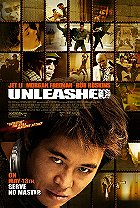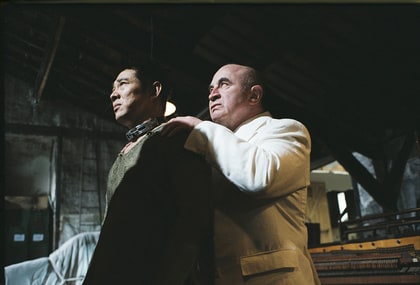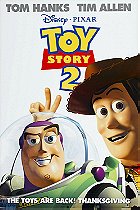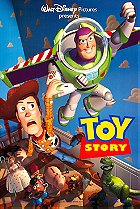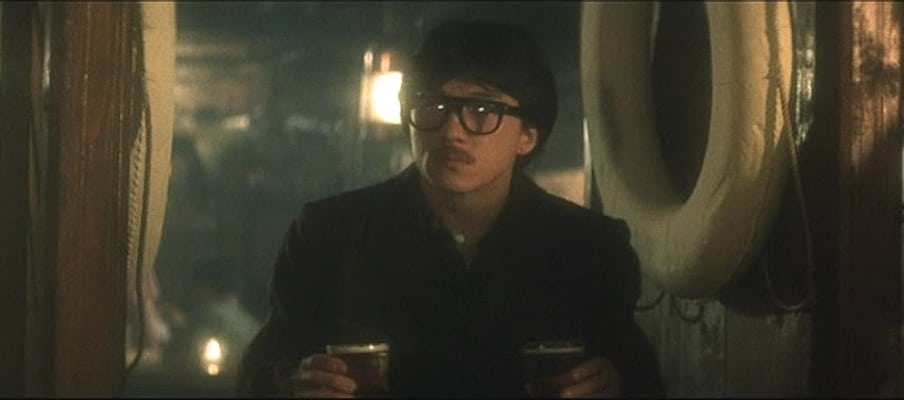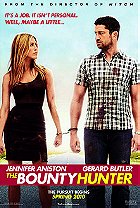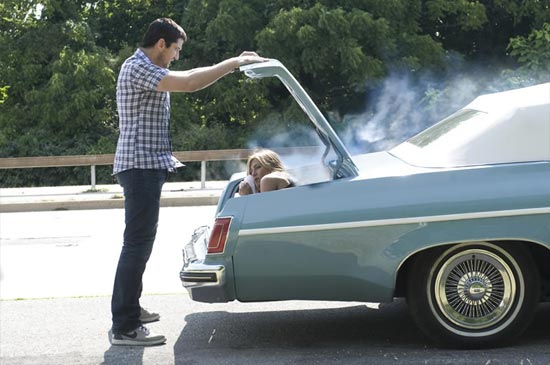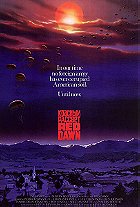Once Pixar Studios released 1995's Toy Story (the first entirely computer-animated feature film in history) the reality of producing CG animated films was realised, and it wasn't long before studios outside of Pixar began making forays into the new genre. DreamWorks has always been a strong contender for Pixar's crown, and among their first endeavours was 2001's Shrek (Antz was their debut). Essentially a fairytale given a contemporary spin with modern humour and hit pop music, Shrek is an excellent animation effort packed with a number of winning elements: an involving narrative, a visually stunning world, a handful of moral lessons, and an enormous handful of laughs. There are sight gags and fart jokes to entertain the younger demographic, while there are several masterfully implemented witticisms for an older audience to enjoy. Shrek is not just a film for the kids - it appeals to anyone of any age group.

Shrek predominantly plays out like the fairy tales it spoofs. Set in the faraway land known as Duloc, Shrek (Mike Myers) lives a comfortable, simplistic life in his beloved swamp, and adores his privacy. Meanwhile, Duloc's heartless ruler Lord Farquaad (John Lithgow) rounds up all the fantastical creatures in his kingdom, evicts them, and forces them to relocate to Shrek's swamp. Peeved by the intrusion on his personal space, Shrek sets off to pay Farquaad a visit. In tow is a motor-mouth donkey known as Donkey (Eddie Murphy). Shrek and Farquaad strike a deal: in return for getting back his swamp, Shrek will undertake a quest to rescue Princess Fiona (Cameron Diaz) from the tower where she is held prisoner. See, Farquaad needs to marry a princess in order for him to become king, but is too afraid to rescue Fiona from the fire-breathing dragon himself.
Co-directed by Andrew Adamson and Vicky Jenson, Shrek works so deviously well due to the way it completely desecrates and subverts the traditional Disney approach. It's a full-scale parody of Snow White, Sleeping Beauty, and Cinderella, while everything in between gets caught up in a fusillade of affectionate piss-takes. Nothing is sacred in the world of fairytales, with bluebirds exploding before our eyes, and frogs and snakes being blown up to make balloons. Fart jokes are present for tots, while there are WWE-style bouts and Matrix-inspired fights to appease the teens, and Eddie Murphy's hysterical Donkey provides a stream of witty dialogue intended for the grown-ups. Simply put, Murphy hasn't scraped these comedic heights for years. Sure, the film is at times too juvenile and it lacks the maturity of Pixar's efforts, but in the end the film is a total blast, and it's easy to recognise that the juvenile elements are all in good fun.

In terms of computer-generated animation techniques, Shrek raised the bar once again - and the bar was already at an impressively high level after Toy Story 2. The movie boasts impressive detail in the almost photorealistic backgrounds, as well as amazingly rendered creatures. The texturing on Donkey alone is incredible - his fur is so meticulously detailed that it looks as if you could reach out and feel the animal's softness. Although the human beings are not entirely lifelike, the technique has markedly improved since Toy Story. In fact, this is the first major computer-animated feature in which humans serve a significant role in the proceedings, and you should have no trouble accepting them as humans. (Antz and Dinosaur had no human characters, while humans played secondary parts in the two Toy Story movies.)
With computer animation becoming a prevalent medium, it's vital to select the right voices for the characters. Voices do define each role, after all, and a bad choice could trigger irreparable damage. Fortunately, Shrek features four capable stars in the lead roles. First and foremost is Mike Myers, who is a vocal chameleon. In the titular role, Myers is terrific; espousing a Scottish brogue that's gruffly lovable. Myers is often upstaged by Eddie Murphy, whose distinctive voice has always been one of his strongest features as a comedian. As proved by Mulan and now Shrek, Murphy is born for these animated roles. The energetic, eager-to-please, loud-mouthed Donkey is one of the funniest characters Murphy has brought to the screen, and his consistently funny remarks are what viewers will likely remember the most about the movie. Meanwhile, Cameron Diaz is a terrific Princess Fiona, and John Lithgow is a memorable villain.

If Shrek is marred by any problems, they lie in the story's resolution. For the first 75 minutes of its runtime the film lampoons fairytales, yet on the home stretch it succumbs to a cookie-cutter fairytale ending. It's a satisfying resolution, sure, but it's nonetheless highly ironic. Thankfully, the movie then closes with a musical number which has Donkey performing his rendition of I'm a Believer, and you'll be almost willing to forgive the conventions. When all's said and done, Shrek is sharp, funny, and engaging on both an emotional and technical level. It's not a guilty pleasure for sophisticated movie-goers; it's purely and simply a pleasure which can be enjoyed by anyone of any age. Unsurprisingly, the film's $485 million box office performance (from a $60 million budget) led to three sequels, beginning with Shrek 2 in 2004.
8.3/10
 Login
Login
 Home
Home 183 Lists
183 Lists 1670 Reviews
1670 Reviews Collections
Collections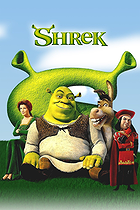
 0 comments,
0 comments, 